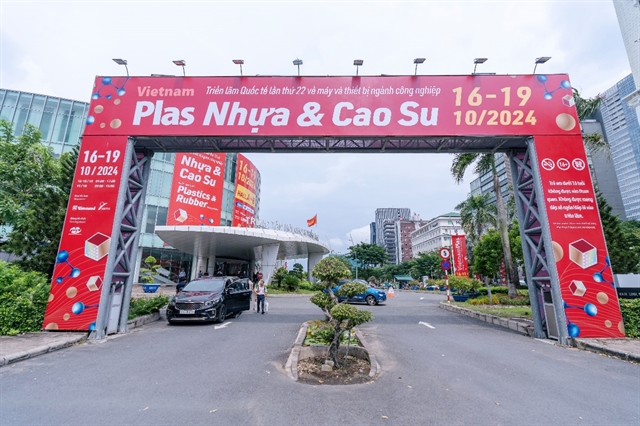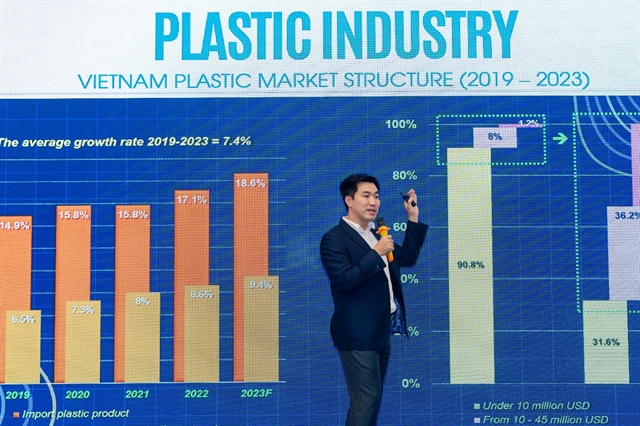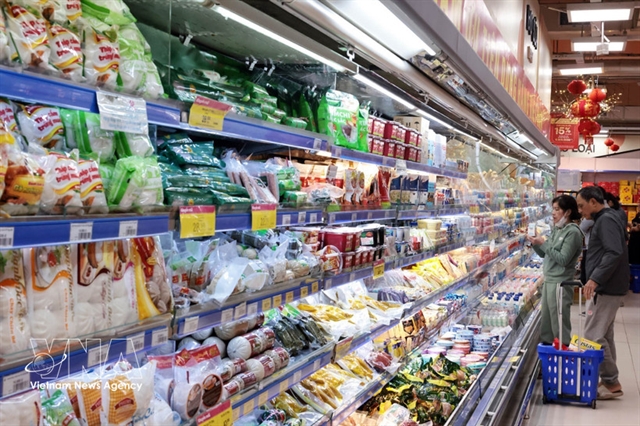 Economy
Economy

HCM CITY — Việt Nam's plastics market is set to experience significant growth, with projections indicating an increase from 10.92 million tons in 2024 to 16.36 million tons by 2029, representing a compound annual growth rate (CAGR) of 8.44 per cent, according to Mordor Intelligence.
In the first half of 2024, plastic exports surged by over 32% year-on-year, reaching $3.15 billion. However, the industry faces challenges, including stricter environmental regulations and a rising global demand for recycled plastics, especially from the US and EU. This push for sustainability is presenting both hurdles and new opportunities.
The recent 22nd Vietnam International Plastics and Rubber Exhibition, held at the Saigon Exhibition and Convention Centre from October 16-19, showcased nearly 600 exhibitors from 15 countries, including notable pavilions from India, South Korea, China, and Taiwan. This event served as a crucial platform for industry professionals to showcase innovations, strengthen partnerships, and explore emerging trends.

|
| A view of the exhibition. — Photo courtesy of the organiser |
A key highlight was the executive seminar focused on advancing sustainability in the plastics and rubber sectors through next-generation materials. Co-organised by CCX Partners and ChanChao International, the seminar attracted over 50 executives and industry leaders from prominent companies such as Mondelez Vietnam, Stavian, Melchers, Accredo Asia Packaging, and Tan Tien Packaging.
Lê Anh, Sustainability Director at DUYTAN Plastic Recycling, delivered a keynote on Việt Nam's sustainability journey and the structural shifts in the industry from 2019 to 2023, driven by increased investment and government incentives aimed at achieving net-zero emissions. "I take pride in sharing the transformative journey of Việt Nam's plastics industry on every global platform I can," he noted.

|
| Lê Anh, Sustainability Director at DUYTAN Plastic Recycling, delivered a keynote at the seminar. — Photo courtesy of the organiser |
Vinay Bhardwaj, Country Head & Vice Chairman of Indorama Ventures Vietnam, emphasised the intersection of sustainability and innovation in the plastics and rubber industries. His focus on extended producer responsibility (EPR) policies reflects a growing commitment to accountability in production processes.
Panel discussions led by industry experts, including insights from Tô Thanh Sơn, ESG Manager at SGS Vietnam, highlighted the importance of compliance with EU Traceability Regulations for Vietnamese exporters. Sơn outlined strategic pathways that could enhance sustainability and circular economy practices in the region.
Bhardwaj also pointed to innovations in green composite materials like Bio-PET and RPET, signaling a significant shift towards sustainable production methods necessary to meet global demands.
The second panel discussion explored the competitive landscape for bio-based and biodegradable materials, presenting opportunities for Vietnamese manufacturers to engage in key international markets. This dialogue is vital for fostering a collaborative approach to sustainability, enabling businesses to adapt and thrive.
Networking and business-matching sessions offered participants opportunities to forge valuable connections, particularly regarding sustainability. Indorama Ventures’ engagement with exhibitors from China, Taiwan, and Việt Nam to source materials like PET and RPET flakes underscores a growing emphasis on responsible sourcing and innovation.
Phuong Nguyen of CCX Partners emphasised the seminar’s role in bridging gaps between foreign investors and Vietnamese businesses, highlighting the importance of such platforms for collaboration and knowledge exchange. This integrated approach is crucial for aligning sustainability goals with business strategies.
The exhibition and seminar underscored a collective commitment among local and international stakeholders to advance sustainable practices in Việt Nam’s plastics and rubber industries. By focusing on sustainability and higher value-added activities, the sector is poised not only to address current market demands but also to secure future growth and resilience. — VNS




